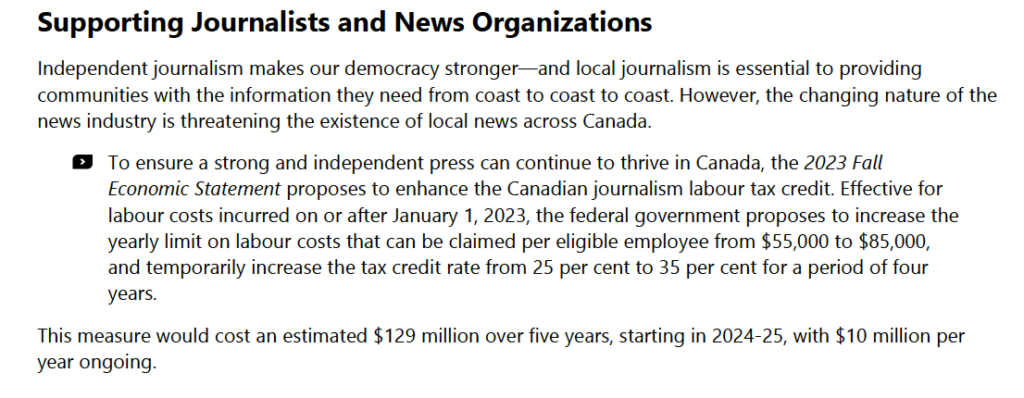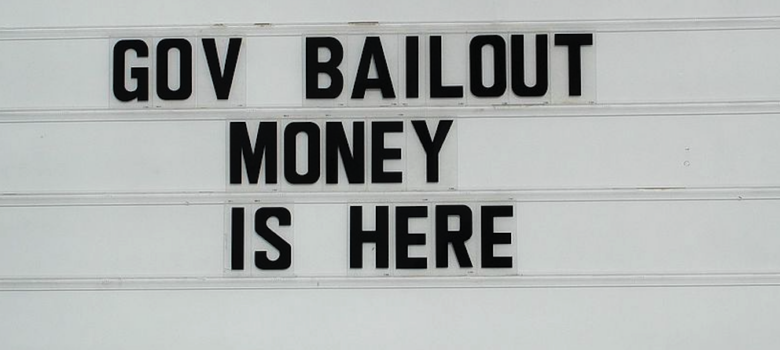The government has taken the first step to creating a bailout for its disastrous Bill C-18 by agreeing to News Media Canada demands to increase the support under the Labour Journalism Tax Credit. While the current system covers 25% of the journalist costs up to $55,000 per employee (or $13,750), the government’s fall economic statement increases both the percentage covered and cap per employee. Under the new system, which is retroactive to the start of this year, Qualified Canadian Journalism Organizations (which covers print and digital but not broadcasters) can now claim 35% of the costs of journalist expenditures up to $85,000 per employee. The increases the support to up to $29,750 per employee or an increase of 116%. This new support will run for four years at a cost of $129 million ($60 million this year alone).
Despite the huge increase and the growing dependence on government support for the news sector, this bailout should not come as a total surprise. Notwithstanding the tough talk, Bill C-18 has been an obvious and unmitigated disaster, resulting in lost traffic and revenues for Canadian news outlets who did not take the prospect of blocked news links on Facebook and Instagram seriously. If blocked news links extends to Google – a decision will presumably be forthcoming in the next month – the effect will be catastrophic to the Canadian media sector. News Media Canada, which was the lead lobbyist for Bill C-18, became the lead lobbyist for a bailout this past summer. As I wrote back in September, the organization was demanding – wait for it – an increase to 35% of costs at $85,000 per employee. In other words, the government gave the lead news media lobbyist in Canada precisely what it demanded.

Fall economic statement, pg 76, https://www.budget.canada.ca/fes-eea/2023/report-rapport/FES-EEA-2023-en.pdf
This raises enormous concerns about the independence of Canadian media. While the government claims this is being done to ensure a “strong and independent” press, it is not hard to see how the opposite may be true. Canadian media was already reluctant to hold government to account on Bill C-18 and now it finds that more than 1/3 of its labour costs for journalists are effectively paid by the government. Indeed, this inches Canadian news outlets ever closer to the CBC, particularly if government legislation is able to extract even more support from external sources such as Google.
I warned back in August that a government bailout was the likely next step given the epic miscalculation of Bill C-18, writing:
The third and most worrisome course of action would be for the government to bail itself out of the Bill C-18 mess by using public money to compensate for the losses that it triggered. But a bail out for its miscalculation should be a non-starter as it would mark a huge government intervention into the media sector and result in the public directly funding media at an unprecedented level that call into question its very independence.
That has indeed come to pass, ultimately leaving the Canadian media less independent and the public spending over $100 million for the mistaken hubris of the Pablo Rodriguez, Pascale St-Onge and the entire Trudeau government.












Thanks for your ongoing coverage of this debacle, Michael.
+1
Paid survey sites offer many benefits for people who want to earn extra money online. Whether you’re looking for a little extra income or just want to share your opinion while getting paid, these platforms are an attractive option. In this article, qv we will explore the benefits of paid survey sites in detail.
Here Join….. https://benefitsextraincome.blogspot.com
Pingback: Liberals to pay for 35% of journalists’ salaries
Superb analysis, Michael. You’ve warned the current gov’t in Ottawa, countless times, the consequence of their fiddling would make the dire situation for media in our country worse, regardless of intent. As more and more ‘reporters’ are subsidized with federal dollars, the very idea of an independent news _medium_ (in whatever format) seems, well…what would you call it? Couple that with the probability of federal vetting of what constitutes Canadian news & information, what else could possibly go wrong?
A fallback plan I’ve had for a while is to just convert writing the news into talking about the news on a platform like YouTube. I’ll probably expand that. There’s a possibility that I’ll make it under the wire with my own news site, but the event that Google deems my site a news outlet (when Meta did not), then I’ll probably be forced to go all in on video content instead.
It’s not the ideal situation where I’m not depending on a platform to keep my journalism efforts alive, but it’s significantly better than just watching my own career vanish overnight with no chance of coming back.
Believe me, I’m not happy about the prospect of the federal government murdering my career, but here we are. :\
where I’m now*
I liked the idea that I read in the comments of one of Michael’s postings.
Let Canadians decide who gets the money and how much. Give every Canadian a 100% refundable tax credit up to some maximum amount for news subscriptions they take on.
This gives the individual Canadian the money they need to get through the paywalls that are being ever more erected and lets them consume the news they want to consume and from whom they want to consume it.
This directly rewards good journalism and shuts down bad journalism.
Give people wallets that they can make their votes with.
A tax credit for subscriptions is just indirect government funding, which will corrupt the journalism/government relationship. Just look at all the misinformation journalists spread in order to get the Online News Act passed. It will only get worse if news organizations become permanently dependent on government funding.
Furthermore, the requirement to decide which news organizations are eligible means we will have government approved news organizations and those that are not approved by the government. And I can’t see how that would promote trust in journalism.
> A tax credit for subscriptions is just indirect government funding,
Of course it is. But in contrast to the direct funding model that the government is doing, it at least puts the decision about who gets the funding into the hands of the consumers instead of captured government.
> which will corrupt the journalism/government relationship
I would suggest that it it will corrupt the relationship much less than the proposed direct funding model as it’s the subscribers who decide who gets the money — not the government.
> It will only get worse if news organizations become permanently dependent on government funding.
Less so if they know their funding is the result of Canadian’s making their own choices rather than having to curry favour with the government.
> requirement to decide which news organizations are eligible
I would propose that along with giving Canadians the ability to direct the funding to the organizations of their choice, Canadians also be allowed to decide which organizations are eligible through a voting/request system.
If I were to want to subscribe with my tax-refundable dollars to Foobar New Org and they were not already eligible there would be a link on their site that would allow me to register my request/vote that they be made eligible through a process the organization is able to follow and participate in transparently.
Ultimately it should be up to every individual Canadian to decide who gets funded and who does not which is what this idea/proposal intends.
Direct (grants, tax credits) or indirect (link tax, mandatory fund contributions, subscriber tax credit) government funding result in politicians being the economic masters of journalists. Politicians will have the power to imitate the press for unfavourable coverage, curry favour for positive coverage, and bestow benefits on groups that lobby them.
Having consumers decide who gets the funding is better than the government deciding, but it still gives politicians too much power over journalists. All the politicians would need to do is reduce the tax credit from 100% to 75% to bring journalists to their knees.
A vote/request system sounds like something that could be easily gamed. Even if it was just a process to be considered for eligibility, you would still require some review committee that bases its decisions on rules set by the government.
I’m also not sure how effective a tax credit would be in increasing funding for journalists. It’s predicated on increasing funding by attracting new subscribers and I have no idea if it would increase subscribers by 50% or 5%.
Individual Canadians already decide who gets funded by directly paying for subscriptions. Having the government reimburse them for those choices just makes journalists subservient to politicians.
> Individual Canadians already decide who gets funded by directly paying for subscriptions.
I would suggest that they don’t in fact. I suspect that a small percentage of people actually dig into their pockets to pay for news subscriptions.
> Having the government reimburse them for those choices just makes journalists subservient to politicians.
But it gives people money to pay for subscriptions that people would otherwise not have nor pay out of pocket for even if they do have it.
I’m not disagreeing that having the government pay for journalism directly (worst) or indirectly (less worse IMO) is not a great situation. But what alternative do we have at this point? Who is going to pay for it?
The government is already going to pay for it. I’d just rather see it directed and decided by the people reading the news than the government themselves. One of those method drives a lot less bias than the other.
Sadly, we don’t fall under what’s deemed to be a Qualified Canadian Journalism Organization.
It’s a tough time to be an independent Canadian new outlet, but we’re just going to continue to keep on fighting the good fight.
Well, that’s embarrassing, *news outlet.
I get paid more than $120 to $130 every hour for working on the web. I found out about this activity 3 months prior and subsequent to joining this I have earned effectively $15k from this without having internet working abilities
Copy underneath site to check it……………………………………. https://paymoney32.blogspot.com/
Pingback: As Online News Act Teeters on Total Failure, Canadian Government Unveils Massive Media Bailout
Pingback: ‘Trudeau’s political problem is bigger than his debt problem’: The Hub reacts to the Fall Economic Statement - The Hub
Pingback: Regulatory, Telecom & Media News - Online Streaming Act hearings get underway - Broadcast Dialogue
Pingback: The Threat to Democracy: Cory Morgan's Concern Over Media Dependency on the State - TruthUSA News Hub
The decision to more than double the tax credit per employee is a game-changer for businesses, offering a welcomed boost in financial support. This move has the potential to stimulate job creation and bolster economic growth. If you’re curious about the finer details and potential implications for various sectors, I’d recommend exploring insights at https://icoholder.com. They often offer comprehensive analyses on economic policies and their impacts on industries.
Pingback: Zdá sa, že Trudeauova vláda ustúpila od plánov na "daň z digitálnych služieb – Oral.sk – Necenzurované správy
The proposed Bill C-18 raises intriguing questions about the government’s role in supporting journalism, particularly with plans to cover many journalist costs for news outlets. While such initiatives aim to bolster media outlets, it’s essential to consider the broader implications and potential impacts on journalistic independence.
As we navigate discussions on media support, it’s also crucial to address personal financial matters. For those interested in financial solutions, especially regarding credit cards, I recently came across a helpful https://fitmymoney.com/guaranteed-credit-card-approval-no-deposit/ resource. It might offer insights for those looking to manage their finances more effectively.
It’s a fascinating and complex topic that requires thoughtful consideration from various perspectives. Looking forward to more discussions and insights on this matter.
Pingback: Newsonomics: Forget the link tax. Focus on one key metric to “save local news” – Tori Woods ISD
Pingback: Government salvages C-18 with Google deal—but it's hardly an example of good policy - The Hub
Pingback: Forget the link tax. Focus on one key metric to “save local news” - stardomfigure
Pingback: Forget the link tax. Focus on one key metric to “save local news” - MyLonavala
Pingback: Forget the link tax. Focus on one key metric to “save local news” - Forkye
Pingback: Trudeau gov’t appears to back down on ‘digital services tax’ plans - Todayville
Pingback: Forget the link tax. Focus on one key metric to “save local news” - Rohit Kamble
Pingback: Forget the link tax. Focus on one key metric to “save local news” Infoset - Infoset
Pingback: The government guts the Online News Act in an attempt to fix a mess of its own making - The Hub